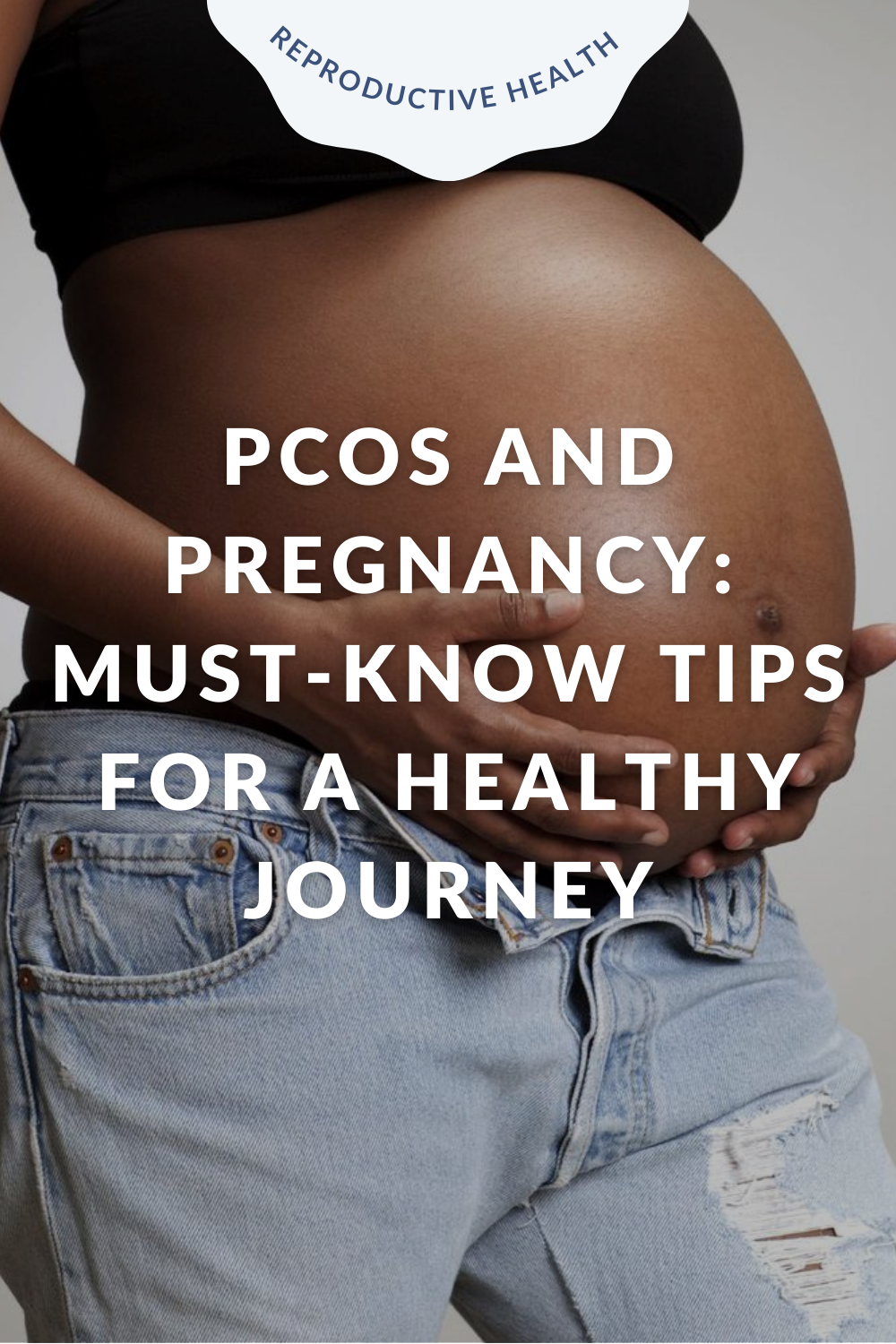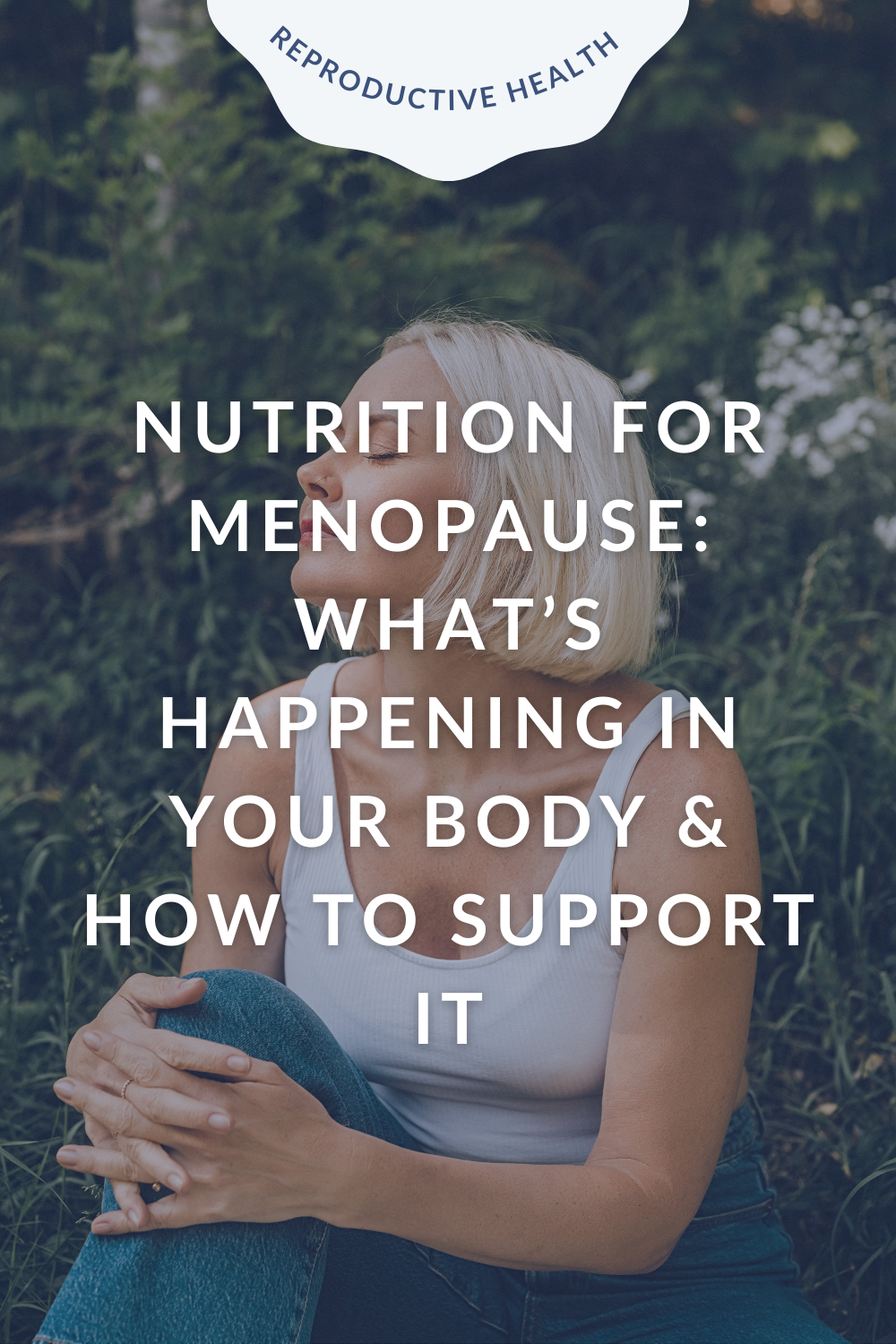PCOS and Pregnancy: Must-Know Tips for a Healthy Journey
Navigating pregnancy when you have PCOS can be uniquely challenging, but you don’t have to face it alone. With the right knowledge, tools and support, you can enjoy a healthy and fulfilling journey to parenthood.
Here’s three key tips to keep in mind to help you confidently navigate your PCOS pregnancy and ensure a smooth postpartum experience.
Blood Sugars in PCOS Pregnancy
Gestational diabetes mellitus (GDM) is something many pregnant people with PCOS need to keep an eye on. Keeping your blood sugar in check is important for your health and your baby's development, for a few reasons:
People with PCOS are more likely to develop GDM because their bodies often have trouble using insulin properly. This insulin resistance means their blood sugar levels can be harder to control. In fact, about 40% of pregnancies in people with PCOS can have complications due to GDM. We say this not to scare you, but so you know to take steps to monitor and manage your blood sugar levels early on!
GDM can increase risk for other health conditions like high blood pressure, preterm birth. It’s important to work closely with your healthcare provider and medical team to keep both you and your baby healthy throughout your pregnancy.
Manage Blood Sugar Levels
As we mentioned above, it's important to keep your blood sugar in check to reduce complications and improve your health. One way to manage your blood sugar levels is by using the glycemic index and, more importantly, glycemic load.
The glycemic index (GI) measures how quickly foods raise your blood sugar after eating. Low GI foods, like whole grains, legumes, and most fruits and veggies, cause slower, more gradual increases. On the other hand, high GI foods, such as refined grains, added sugars and natural sweeteners, cause quicker spikes.
But before you raid your cupboards to toss all high GI foods, know that it doesn't tell the full picture of blood sugar control. We absolutely don’t advise avoiding all high GI foods. The key is to focus on the overall glycemic load (GL) of your meal, which takes into account both the GI and the amount of carbs you’re eating.
This gives a better picture of how your meal affects your blood sugar. So, if you’re eating your favourite high GI foods with intention, pair it with proteins and unsaturated fats to lover the overall glycemic load of the meal. This can help to keep your blood sugar levels more stable.
For more information about managing your blood sugar during pregnancy, you can read our blog, How to Manage Gestational Diabetes with Diet and Lifestyle.
Medications and Supplements Safety in PCOS Pregnancy
Understand PCOS Medication Risks
When managing PCOS during pregnancy, it’s good to know about the medications your doctor may prescribe and their potential risks and benefits.
A common medication to treat PCOS and GDM is Metformin. This medication improves your body’s sensitivity to insulin, helping to manage blood sugar levels.
Metformin has been studied in pregnant people with GDM and type 2 diabetes, and the results are encouraging. It can help you keep your blood sugar levels in check and may even help reduce the risk of pregnancy-related high blood pressure. While Metformin does cross the placenta, Diabetes Canada guidelines state that using Metformin in the first trimester does not increase the risk of birth defects, nor does it harm the baby’s development.
It’s important to talk with your healthcare provider if you have any questions about the medications you are prescribed so that you fully understand their benefits and potential side effects.
Supplement Safety
There are a lot of supplements out there, and it can be confusing to know which ones are actually worth your money. Not to mention, which ones are safe during pregnancy.
Inositol: Inositol, particularly Myo-Inositol, can help control your blood sugar levels and may also reduce the risk of neural tube defects (NTDs) in your baby. Studies suggest that starting Myo-Inositol at least one month before conception and continuing until the 36th week of pregnancy may reduce the risk of GDM and NTDs. The good news is that Myo-Inositol is generally safe when taken at the recommended doses (2 grams twice a day), and is now included in the international guidelines for PCOS management.
Omega-3 fatty acids: Omega-3 fatty acids, found in fish oil, are great for supporting heart health. For people with PCOS, Omega-3s may help improve insulin sensitivity and reduce inflammation. Although research on their effectiveness in preventing GDM is mixed, some studies show benefits for insulin resistance and fat levels in the blood. Omega-3 supplements are usually safe in tolerable doses, we also suggest ensuring the supplement is third-party tested for purity and efficacy.
Vitamin D: Vitamin D is super important for your overall health, and having low blood levels during pregnancy can increase the risk of GDM and other complications. When you have PCOS, Vitamin D can enhance insulin sensitivity and improve how your body processes sugar. It’s a good idea to get your Vitamin D levels checked early in pregnancy and follow your healthcare provider’s advice on how much to take. The usual dose is 600-2000 IU per day, but your healthcare provider might recommend a different amount based on baseline.
Remember to always chat with your healthcare provider before starting any new supplements to ensure they’re right for you and to avoid any potential interactions with other medications. For more personalized guidance, consider our 1-on-1 nutrition coaching programs to build a strong and personalized supplement and dietary plan.
PCOS Postpartum Considerations
Mental Health
Giving birth and becoming a parent is a massive change! In addition to the shift in daily life, there's hormonal shifts going on below the surface that can increase your risk for postpartum depression.
Postpartum blues: Right after having your baby, it’s common to experience the “baby blues.” You might feel tearful, anxious, or irritable — about 50 to 85% of new moms go through this. These feelings usually peak around the fourth or fifth day after delivery and typically go away within two weeks. It's a normal part of the postpartum period and doesn't usually need treatment.
Postpartum depression (PPD): For some, the mood changes can be more severe and stick around longer. Around 10 to 15% of new mothers develop PPD. This can feel like a deep sadness, losing interest in things you once loved, feeling guilty or worthless, being exhausted all the time, and having trouble sleeping or eating. It’s more intense than the baby blues and lasts longer, so it’s really important to reach out for help if you're feeling this way. Many women with PCOS don't even realize they have it, especially if they don’t have easy access to healthcare.
If you’re feeling overwhelmed, anxious, or depressed, seeking support can make a significant difference. Early intervention and treatment can prevent symptoms from worsening and enable you to enjoy your time with your new baby. There are many resources available to assist new mothers, such as:
Talking to a therapist can provide you with tools to manage your emotions.
Speaking with your physician to discuss potential medications.
Support groups — either in person or online — can connect you with other moms who understand what you’re going through.
Don’t hesitate to lean on your partner, family, and friends for emotional support and help with daily tasks.
Chestfeeding and PCOS
Chestfeeding, or breastfeeding, provides your baby with essential nutrients and antibodies, boosting their immune system and promoting healthy growth. Plus, it promotes bonding with your baby and can lower yourrisk of developing type 2 diabetes.
However, it’s important to know that people with PCOS might have a tougher time starting to chestfeed, but once you get the hang of it, things can go smoothly. This is because high levels of certain hormones (testosterone and DHEAS) in PCOS can sometimes make milk production harder. Here’s how you can tackle these challenges:
Diet and hydration: Consider focusing on foods that support milk production, like oats, nuts, and leafy greens. And don't forget to drink plenty of water throughout the day to stay hydrated. Staying well-hydrated helps keep your energy levels up and supports your overall health, making it easier for you to take care of yourself and your little one. Drinking plenty of water also ensures that you have the fluids you need to keep your milk supply steady.
Support and resources: Before your baby arrives, gather as much support as you can. Attend chestfeeding classes, meet with a lactation consultant, and join local support groups. Having a strong network can make a huge difference.
Patience and understanding when to seek alternatives: Establishing a good milk supply takes time and patience. Don’t get discouraged if things don’t go perfectly right away. That said, it's not for everyone, and there is certainly no moral imperative to force it. If it's not working for your family, consider feeding alternatives (formulas are nutritionally complete, and exist for a reason)! Either way, you're doing great.
Ongoing Health Management
Regular postpartum check-ups give your healthcare provider a chance to check on your recovery and help with any concerns you might have, like managing your blood sugar levels or adjusting medications. They’re also a perfect opportunity to talk about any challenges you’re facing as a new parent.
The Takeaway on PCOS and Pregnancy
Navigating a PCOS pregnancy can be manageable with the right knowledge and support. Regular check-ups and a balanced lifestyle can keep you on track. Remember, small changes can make a big difference, and you’re not alone—seek support when needed, and we’re here for you every step of the way!
Hi! I’m Trista
A Registered Dietitian and reproductive health expert. I’m here to help you gain confidence to overcome your Polycystic Ovary Syndrome and digestive health woes, while bettering your relationship with food.
CATEGORIES
Struggling to find sustainable healthy eating habits for lasting PCOS relief? Our personalized, one-on-one nutrition coaching programs are designed to help you break free from restrictive diets and build a confident, clear path to managing PCOS.
With tailored guidance from our expert dietitians, you’ll receive the structure and support you need to eat with confidence and feel good in your body again.
Prefer the power of community support? Join our PCOS Recovery Group coaching program, where you'll connect with others on the same journey, get access to >20 video learning modules to learn evidence-based strategies, and gain the accountability you need to thrive.
Resources
Diabetes Canada. (2024). Gestational diabetes. https://www.diabetes.ca/about-diabetes/gestational
National Institute of Diabetes and Digestive and Kidney Diseases. (2017). Definition & Facts of Gestational Diabetes. https://www.niddk.nih.gov/health-information/diabetes/overview/what-is-diabetes/gestational/definition-facts
Li, X., Liu, X., Zuo, Y., Gao, J., Liu, Y., & Zheng, W. (2021). The risk factors of gestational diabetes mellitus in patients with polycystic ovary syndrome: What should we care. Medicine (Baltimore), 100(31), e26521–e26521. https://doi.org/10.1097/MD.0000000000026521
Choudhury, A. A., & Rajeswari, V. D. (2022). Polycystic ovary syndrome (PCOS) increases the risk of subsequent gestational diabetes mellitus (GDM): A novel therapeutic perspective. Life Sciences (1973), 310, 121069–121069. https://doi.org/10.1016/j.lfs.2022.121069
Slouha, E., Alvarez, V. C., Gates, K. M., Ankrah, N. M. N., Clunes, L. A., & Kollias, T. F. (2023). Gestational Diabetes Mellitus in the Setting of Polycystic Ovarian Syndrome: A Systematic Review. Curēus (Palo Alto, CA), 15(12), e50725–e50725. https://doi.org/10.7759/cureus.50725
Yu et al. Association between polycystic ovary syndrome and the risk of pregnancy complications: A PRISMA-compliant systematic review and meta-analysis. Medicine (Baltimore). 2016; 95(51):e4863.
Qin et al. Obstetric complications in women with polycystic ovary syndrome: a systematic review and meta-analysis. Reprod Biol Endocrinol. 2013; 11:56.
Artini et al. Endocrine and clinical effects of myo-inositol administration in polycystic ovary syndrome. A randomized study. Gynecol Endocrinol. 2013; 29(4):275-9.4. Benelli et al. A Combined Therapy with Myo-Inositol and D-Chiro-Inositol Improves Endocrine Parameters and Insulin Resistance in PCOS Young Overweight Women. Int J Endocrinol. 2016:3204083.
Constantino et al. Metabolic and hormonal effects of myo-inositol in women with polycystic ovary syndrome: a double-blind trial. Eur Rev Med Phamacol Sci. 2009; 13:105-10.
D’Anna et al. Myo-inositol may prevent gestational diabetes in PCOS women. Gynecol Endocrinol. 2012; 28(6):440-2.
D’Anna et al. Myo-Inositol supplementation and onset of gestational diabetes mellitus in pregnant women with a family history of type 2 diabetes: a prospective, randomized, placebo-controlled study. Diabetes Care. 2013; 36(4):854-7.
Santamaria et al. Myo-inositol may prevent gestational diabetes onset in overweight women: a randomized, controlled trial. J Matern Fetal Neonatal Med. 2016; 29(19):3234-7.
D’Anna et al. Myo-inositol Supplementation for Prevention of Gestational Diabetes in Obese Pregnant Women: A Randomized Controlled Trial. Obstet Gynecol. 2015;126(2):310-5.
Matarrelli et al. Effect of dietary myo-inositol supplementation in pregnancy on the incidence of maternal gestational diabetes mellitus and fetal outcomes: a randomized controlled trial. J Matern Fetal Neonatal Med. 2013;26(10):967-72.
Dell’ Edera et al. The influence of D-chiro-inositol and D-myo-inositol in pregnant women with glucose intolerance. Biomed Rep. 2017; 7(2):169-172.
Jorquera, G., Echiburú, B., Crisosto, N., Sotomayor-Zárate, R., Maliqueo, M., & Cruz, G. (2020). Metformin during Pregnancy: Effects on Offspring Development and Metabolic Function. Frontiers in Pharmacology, 11, 653–653. https://doi.org/10.3389/fphar.2020.00653
Ryssdal, M., Vanky, E., Stokkeland, L. M. T., Jarmund, A. H., Steinkjer, B., Løvvik, T. S., Madssen, T. S., Iversen, A.-C., & Giskeødegård, G. F. (2023). Immunomodulatory Effects of Metformin Treatment in Pregnant Women With PCOS. The Journal of Clinical Endocrinology and Metabolism, 108(9), e743–e753. https://doi.org/10.1210/clinem/dgad145
Diabetes Canada Clinical Practice Guidelines Expert Committee. Diabetes Canada 2018 Clinical Practice Guidelines for the Prevention and Management of Diabetes in Canada. Can J Diabetes. 2018;42(Suppl 1):S1-S325.
Ibrahim, I., Bashir, M., Singh, P., Al Khodor, S., & Abdullahi, H. (2022). The Impact of Nutritional Supplementation During Pregnancy on the Incidence of Gestational Diabetes and Glycaemia Control. Frontiers in Nutrition (Lausanne), 9, 867099–867099. https://doi.org/10.3389/fnut.2022.867099
Facchinetti, F., Cavalli, P., Copp, A. J., D’Anna, R., Kandaraki, E., Greene, N. D. E., & Unfer, V. (2020). An update on the use of inositols in preventing gestational diabetes mellitus (GDM) and neural tube defects (NTDs). Expert Opinion on Drug Metabolism & Toxicology, 16(12), 1187–1198. https://doi.org/10.1080/17425255.2020.1828344
MGH Center for Women's Mental Health. (n.d.). Perinatal & Reproductive Psychiatry at Mass General Hospital. https://womensmentalhealth.org/specialty-clinics-2/postpartum-psychiatric-disorders-2/
CAMH. (n.d.). Postpartum Depression. https://www.camh.ca/en/health-info/mental-illness-and-addiction-index/postpartum-depression
Koric, A., Singh, B., VanDerslice, J. A., Stanford, J. B., Rogers, C. R., Egan, D. T., Agyemang, D. O., & Schliep, K. (2021). Polycystic ovary syndrome and postpartum depression symptoms: a population-based cohort study. American Journal of Obstetrics and Gynecology, 224(6), 591.e1-591.e12. https://doi.org/10.1016/j.ajog.2020.12.1215
Vanky, E., Isaksen, H., Haase Moen, M., & Carlsen, S. M. (2008). Breastfeeding in polycystic ovary syndrome. Acta Obstetricia et Gynecologica Scandinavica, 87(5), 531–535. https://doi.org/10.1080/00016340802007676
















